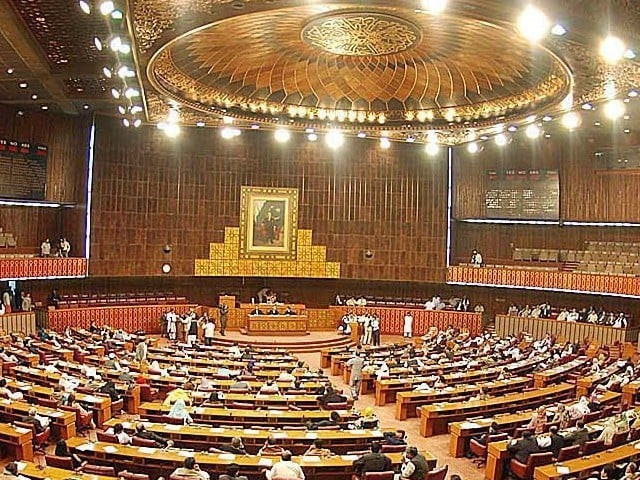Most judges say parliament’s powers limited
They noted that the court is vested with the jurisdiction to interpret the Constitution

National Assembly of Pakistan. PHOTO: APP
Five judges of the top court, namely Justice Jawwad S Khawaja, Justice Ejaz Afzal Khan, Justice Ijaz Ahmad Chaudhry, Justice Dost Muhammad Khan and Justice Qazi Faez Isa, on Wednesday gave a verdict against the 21st Constitutional Amendment.
Justice Khawaja declared that parliament is not sovereign or supreme in the sense that there are no limitations on its power to amend the Constitution. “The limitations on the parliament are not only political but are borne out from the Constitution itself.”
He also ruled that the Supreme Court has the power to judicially review a constitutional amendment passed by parliament and also to strike it down.
Eight judges dismissed the petitions against the 18th and 21st amendments but noted that democracy, parliamentary form of government and independence of the judiciary are the silent features of the Constitution.
These judges included Justice Anwar Zaheer Jamali, Justice Sarmad Jalal Osmany, Justice Amir Hani Muslim, Justice Gulzar Ahmed, Justice Sh Azmat Saeed, Justice Mushir Alam, Justice Umar Ata Bandial and Justice Maqbool Baqar.
“The parliament, in view of Articles 238 and 239 is vested with the power to amend the Constitution as long as the salient features of the Constitution are not repealed, abrogated or substantively altered,” their verdict said.
They noted that the court is vested with the jurisdiction to interpret the Constitution in order to ascertain and identify its defining salient features. “It is equally vested with jurisdiction to examine the vires of any constitutional amendment so as to determine whether any of the salient features of the Constitution has been repealed, abrogated or substantively altered as a consequence,” they observed.
These judges declared that the 21st Amendment does not abrogate, repeal, or substantively alter the salient features of the Constitution.
However, four judges of the top court, namely Chief Justice Nasirul Mulk, Justice Mian Saqib Nisar, Justice Asif Saeed Khosa and Justice Iqbal Hameed ur Rehman, rejected the basic structure theory and declared that parliament is the supreme institution and can bring any amendment in the Constitution.
In his note, the chief justice wrote that Article 239 does not lay down any such requirement or restriction upon parliament. He further stated that neither the basic structure theory nor the Objectives Resolution of the Constitution can be made a ground to annul any amendment in the Constitution.
“There is no divide between ‘legislative powers’ and ‘constituent powers’ in the Constitution of Pakistan. Parliament under the constitutional structure of Pakistan has both legislative and constitutive powers,” he noted.
Justice Nasirul Mulk said the powers conferred on the court under Article 184 (3) of the Constitution cannot be exercised to strike down any amendment in the Constitution even if it violates any of the fundamental rights.
Justice Mian Saqib Nisar wrote that the ‘basic features’ doctrine should not be adopted and made part of the constitutional law of Pakistan. “I am equally firmly of the view that the ‘basic features’ doctrine should not be adopted and made part of the constitutional law of Pakistan.”
He said the ultimate power should flow not from the pens of judicial appointees, but from the elected representatives of the people of Pakistan. “A powerful judiciary is not necessarily an independent judiciary. And conversely, an independent judiciary is not necessarily a powerful judiciary,” he noted.
Justice Asif Saeed Khosa stated that the 1973 Constitution clearly recognises parliament as a legislative as well as a constituent body as it expressly allows it to amend the Constitution and places no restriction upon its powers to amend the Constitution.
“The Constitution also expressly ousts the jurisdiction of the judiciary from entertaining any challenge against an amendment of the Constitution brought about by the parliament in accordance with the prescribed procedure,” he said.
He also observes that the people of Pakistan have given no mandate to the judges or courts qua judicial review of constitutional amendments and “the same is evident from the provisions of clause (2) of Article 175 and clause (5) of Article 239 of the Constitution.”
Published in The Express Tribune, August 6th, 2015.



















COMMENTS
Comments are moderated and generally will be posted if they are on-topic and not abusive.
For more information, please see our Comments FAQ